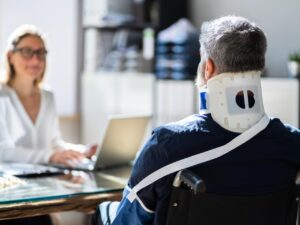Recently, at Chancery Lane, London, I had the pleasure of attending a lecture by UK Law Society President on the future of technology and the Law. The following is an extract of some of the points made by him :-
“Artificial intelligence is not only around us but it is part of us
Better, faster, more productive… these used to be words to describe what we wanted from our internet broadband connection.
Now they describe what we expect not only from all our products and services but also from each other. The expectations that we have from the world and the world has from us are dynamic, ever-changing and transforming at speed.
By combining a basket of different technologies, artificial intelligence (AI) is increasingly seen as the answer to these unprecedented expectations and needs:
- Siri, on your iPhone, is artificial intelligence
- Anti-lock brakes in your car, learning the road conditions is artificial intelligence
- Amazon’s recommendations on things that you might like is artificial intelligence
AI is all around us. Complicated and repetitive tasks are better performed by computer algorithms and mechanisms than by the human mind. The margin of error is narrower, the work is done more quickly and the training required is minimal.
Around the world the justice and legal systems have started to embrace the use of technology and the benefits of artificial intelligence. Data analytics are used, for example, to help predict crime and shape social policy.
Firms all around the world have improved the way they conduct legal research by using systems like ROSS. Developed by IBM, it is a tool which allows legal practitioners to use natural language and ask questions, rather than use keywords. ROSS then provides citations and suggests topical readings from a variety of sources.
The uses of artificial intelligence do not stop there, however. I recently looked at an app that:
- tracks how many steps we take
- tracks how many hours of sleep we have, and even
- tracks our heartbeats.
We are living in a world in which we have become part of the app.
Our phones and gadgets seem to know us better than we know ourselves. They can even pass judgement on our lifestyle choices, such as congratulating us when we hit a certain fitness target. Mine has broken, as it seems to have forgotten to congratulate me…
We must face the fact that artificial intelligence will become more entrenched in our lives. There is a correlative duty for us as solicitors to scan the horizon, think of the consequences of its uses and, where needed, we must act.
What are the consequences?
There is a wealth of research on the ethical consequences of artificial intelligence. However, I just want to focus on the legal effects that result from this new use of technology.
Use of data
Artificial intelligence relies heavily on the use of personal and corporate data for all its practical applications. This inevitably raises serious issues of privacy and data protection. How will ‘big data’ – such as your search engine history, your online banking, your medical history – be collected, be used, and stored? For what purposes can that data be accessed and by whom? Who is responsible for keeping it safe? How will we handle global data breaches across different jurisdictions?
There is some domestic and emerging international legislation on data protection, however, it is limited and reactive. The legal profession has a responsibility to start answering these questions now and to work together with policy makers and legislators to build a robust framework with appropriate safeguards.
Tort and accountability
Corporate technology giants, software developers and computer programmers are leading on innovation and setting the pace of a new world order.
Google estimates that in less than five years, there will be driverless cars on the streets of our main cities. This activity, which inevitably involves risk, raises questions of tort and accountability when things go wrong.
These self-driving systems may need to make split-second decisions that raise legal questions. A child suddenly runs into the road and the car has to choose: hit the child or swerve into an oncoming bus.
- How does the car decide?
- Who decides what the car decides?
- Who is liable if it makes the wrong decision?
Legal practitioners and academics need to come together to think ahead of the consequences of the new uses of technology and put forward ideas for the best legal response. ”
So, interesting Technological Times ahead for the legal profession !
I believe that much of what we do will be replicated by computers within 15 years. How will solicitors in Kilkenny and rural Ireland survive? That’s the question we need to be asking regularly.




